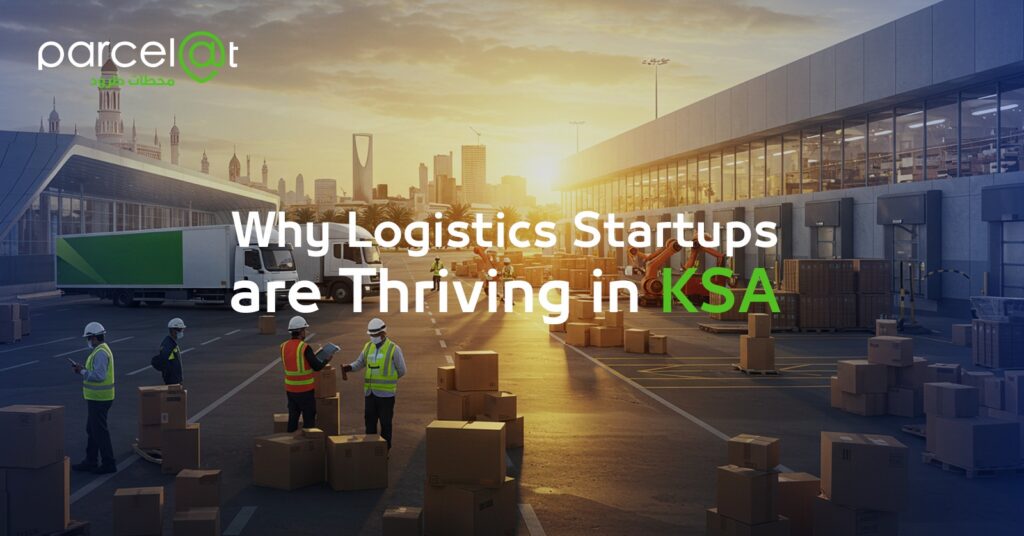
The logistics sector in Saudi Arabia is changing at a pace few could have predicted just a decade ago. From global players like DHL, Aramex, and SPL (Saudi Post) to innovative startups such as Parcelat, the Kingdom has become one of the most exciting markets in the world for delivery solutions. And at the heart of this growth lies one simple truth: people in KSA expect smarter, faster, and more flexible ways to receive their goods.
The Bigger Picture: Vision 2030 and Logistics Growth
Saudi Arabia’s Vision 2030 has put logistics front and center. The government wants the Kingdom to become a global logistics hub, connecting continents and streamlining the flow of goods. This isn’t just about ports, airports, and highways, but also about the last mile, the part of the journey that connects the warehouse or store directly to the customer.
Startups have quickly seen the opportunity here. While international giants like DHL and Aramex bring global networks and experience, smaller companies are finding ways to meet local needs more directly. By focusing on technology, convenience, and customer experience, these startups are filling in the gaps and often setting new standards.
Why Startups are Thriving
Startups in KSA thrive for a few key reasons:
- Local Knowledge
Knowing how people shop, what their expectations are, and the cultural habits around delivery makes a huge difference. For example, consumers in Saudi Arabia want the flexibility to pick up their packages when it suits them, whether late at night or between busy work meetings. This is where local startups like Parcelat excel. - Technology First
Unlike older logistics models that relied heavily on manpower and manual tracking, startups are built on digital infrastructure from day one. Smart parcel lockers, tracking apps, and real-time updates are not “extras”, they are part of the core service. - Flexibility
Large companies can sometimes be slower to adapt. Startups, on the other hand, can shift quickly to meet customer needs, whether that means expanding locker networks or testing new pickup models.
The Role of Smart Parcel Lockers
One of the clearest examples of innovation in Saudi logistics is the rise of the smart parcel locker. For many consumers, this technology has already changed the way they think about delivery. Instead of waiting at home for a package or dealing with repeated failed delivery attempts, customers can now collect their parcels from a locker, using a secure code, at any time of day.
Parcelat has led the charge here, building a wide network of lockers across major cities. The lockers are placed in convenient, everyday locations, which means consumers can grab their parcels while running errands, on their way home from work, or even late at night. For a market as busy and fast-moving as KSA, this level of convenience has quickly become more of a necessity than a luxury.
Global Names and Local Collaboration
Companies like DHL, Aramex, and SPL have been operating in Saudi Arabia for years, but the rise of startups has opened new opportunities for collaboration. Startups bring speed, fresh ideas, and local adaptability. Established players bring scale, trust, and global reach.
Take the recent partnerships between startups and global companies. By working together, they can combine their strengths to deliver better services for customers. For instance, when a company like DHL integrates a smart locker network like Parcelat’s into its operations, the result is a smoother, more reliable system for everyone.
Meeting Modern Consumer Needs
The modern Saudi consumer expects delivery services to be fast, reliable, and flexible. They also value privacy and security, especially when it comes to home addresses. This is another reason why startups are thriving. Smart parcel lockers provide a secure alternative to traditional home delivery. The only person with access to the locker is the customer with the one-time code, and the locker itself is monitored and secure.
For many, this solves long-standing frustrations. No more missed calls from delivery drivers, no more arranging for someone else to be at home to receive a package, and no more worries about delivery times clashing with work or personal schedules.
The Ripple Effect on the Economy
The rise of logistics startups doesn’t just make life easier for consumers, it also supports Saudi Arabia’s broader economic goals. New delivery models create jobs, attract foreign investment, and help small businesses reach customers more effectively. As online shopping continues to grow, the need for smarter logistics solutions only gets stronger.
By building infrastructure like smart parcel lockers and offering innovative last-mile services, startups are making e-commerce more efficient and reliable. This directly boosts the retail and digital economy, aligning perfectly with the Kingdom’s Vision 2030 objectives.
Parcelat as a Case Study
Among the many startups driving this growth, Parcelat stands out as a clear example of how local innovation can transform logistics. The company’s focus on smart parcel lockers has already solved some of the most common problems with delivery in KSA. Their lockers give customers 24/7 access to their parcels, reduce failed delivery attempts, and offer a more secure and private alternative to traditional methods.
By partnering with major players like DHL, Parcelat is showing how startups and global leaders can work together to create delivery systems that are not only efficient but also more customer-friendly. It’s a model that other startups in KSA may look to follow.
Conclusion: A Bright Future for Logistics Startups
The logistics landscape in Saudi Arabia is shifting quickly, and startups are leading the way. With government support, growing consumer demand, and the willingness of global players like Aramex, DHL, and SPL to collaborate, the future looks bright.
As companies like Parcelat continue to expand their smart parcel locker networks and develop innovative services, consumers across KSA will enjoy a delivery experience that is faster, smarter, and more secure. The rise of these startups isn’t just a trend, it’s a fundamental change in how logistics works in the Kingdom, and it’s only the beginning.





